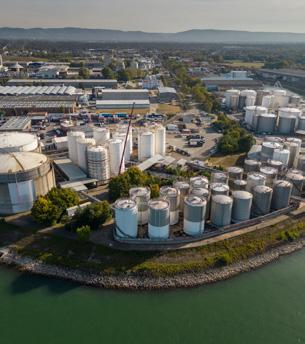








PRODUCTION: David Hill
Michael Avison, CEO at Landmark Power Holdings, tells Energy Focus that swift progress is being made across its first two major developments as it rolls out natural gas-powered electricity generation but with carbon capture technology, creating low carbon energy for residential and industrial clients in the communities around its pioneering projects.
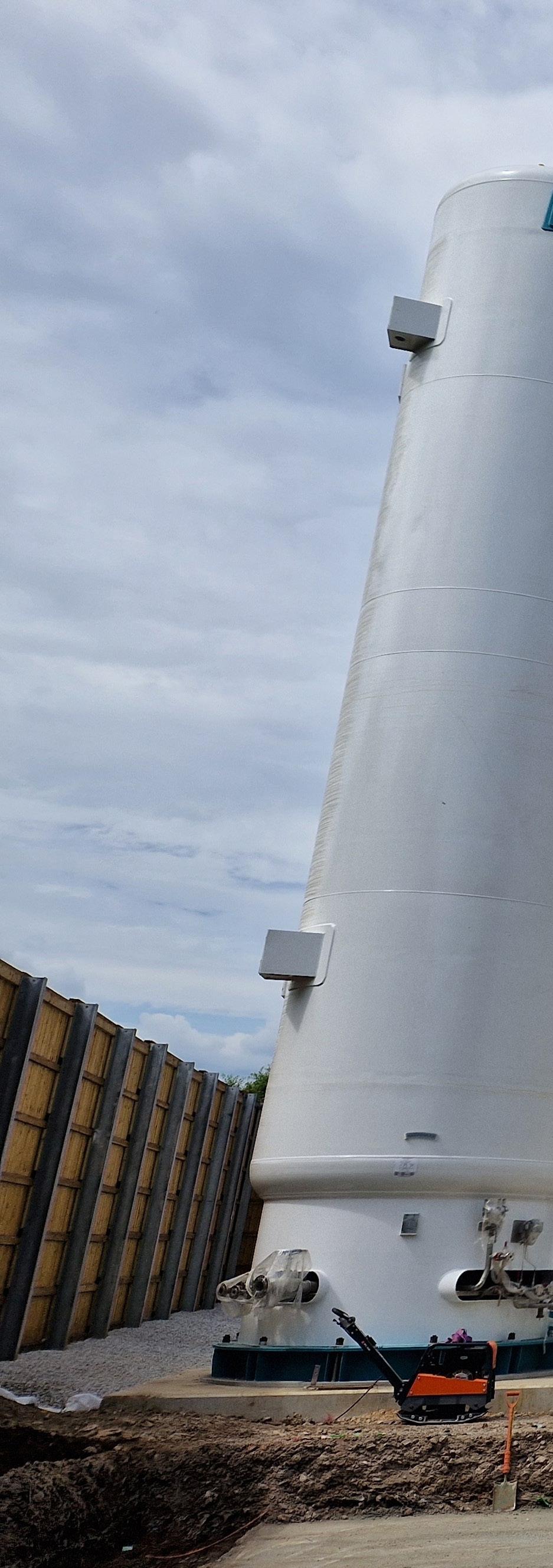


//In 2019, Michael Avison saw an opportunity. Active in the energy industry for his entire career, this engineer knew that gas generation will, for the foreseeable future, continue to deliver reliable power for a UK grid that is beset with challenges. As the energy transition continues, technology will bridge the past and the widespread use of fossil fuels with the future and the rollout of renewable energies and green concepts.
Avison established Landmark Power Holdings (LMPH), a developer of highend technology low-carbon generating assets, based in London, with the aim of achieving circularity in the generation of energy and sustainable fuels. The company began its journey in 2020, while many others were slowing down or struggling, and quickly went from
start up to respected player following the speedy ramp up of its first project – Rhodesia – in Nottinghamshire.
Rhodesia sees LMPH partner with Victory Hill – a specialist investment firm – to build a 10MW capacity carbon capture power plant, powered by natural gas, that has the ability to power more than 10,000 homes in the local area. £42 million was invested in the site near Worksop, and local businesses were also included in the offtake arrangements. Expected to be fully operational, including the carbon capture element, by the end of this year, Avison is happy with progress and reiterates the company’s commitment to supporting the energy transition.
“We use natural gas which is a transition fuel,” he says. “The point of what we’re doing is about flexile power generation with carbon capture
to support the renewable industry. As more wind farms come online, the grid becomes more unstable and therefore you need gas-fired technologies to support the grid.”
LMPH utilises advanced gas engines from carefully selected partners, including Rolls Royce MTU, and combines carbon capture technology from ASCO Carbon Dioxide to clean emissions through a liquid system, creating a usable liquid CO2 product suitable for us in the food and beverage industries. The plant will also create heat which can be utilised to improve efficiency across the system in what is a first for the UK market.
“We focus on local and independent, low carbon power generation. Our preference is to keep
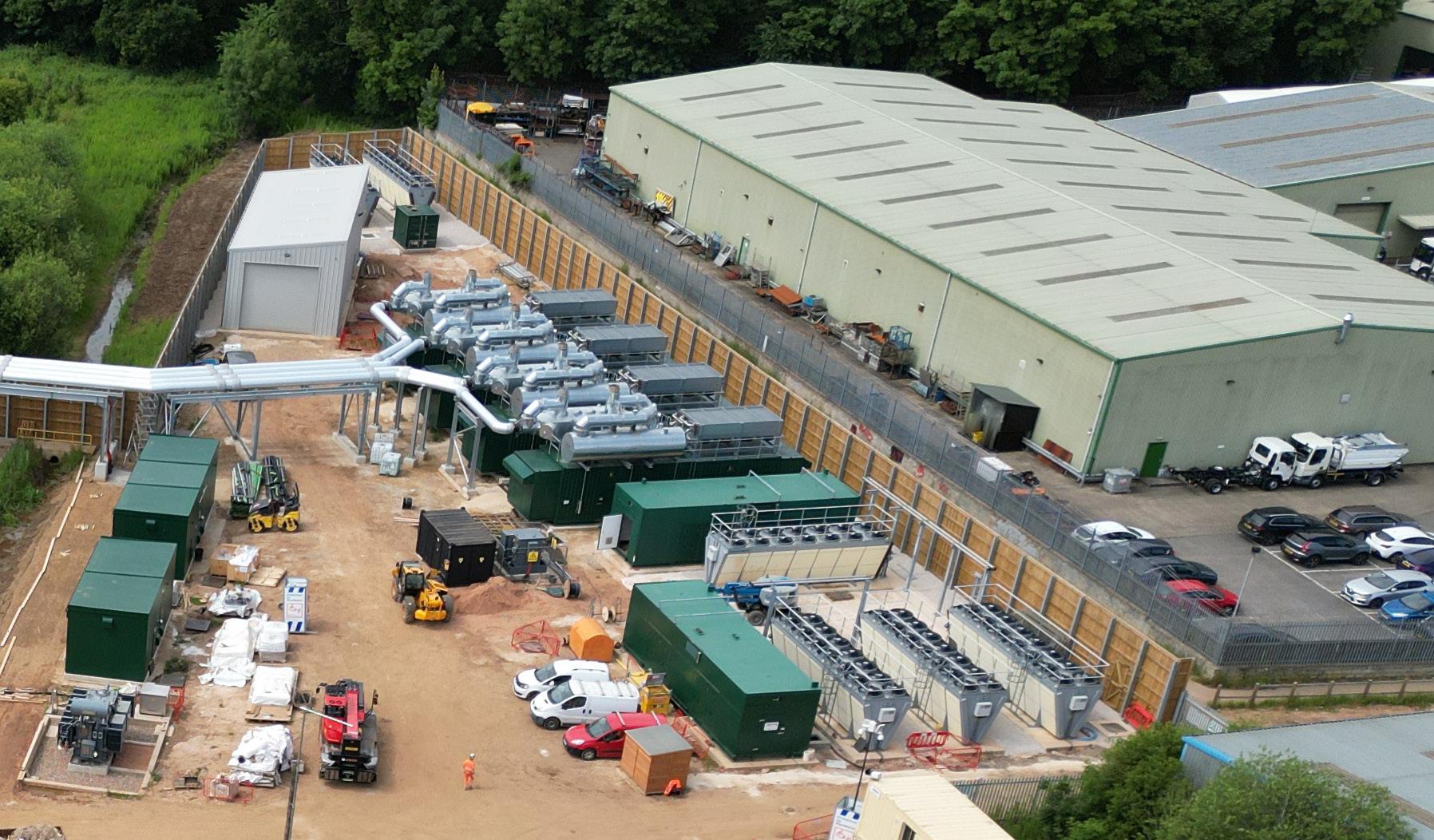
it small and go local – that is our key USP. Using carbon capture, the CO2 footprint is reduced by 95% and we remove all NOx. We produce CO2 for the drinks industry where it is required but is currently produced in a much more polluting way,” says Avison.
The build of Rhodesia began in 2023 and first power has already been supplied to the grid. Avison explains that the process was a challenge, but the team in place at LMPH ensured the smooth rollout using its extensive industry experience.
“We financed the first project in 2021 and we went through the construction period while one of the key contractors went bust,” he recalls. “We then had to take on the mantle and we managed to get everyone together and keep the project on track. We have fired the first four engines, and they
are now connected to the grid capable of producing electricity. We are going through the rest of the installation and commissioning of the whole plant. We will be doing molecule to molecule, methane to CO2, by September.”
World leading industrial companies are active across the supply chain. LMPH takes a modular approach to technology implementation, using advanced engineering and project knowledge to install the right elements in the right place at the right time. The focus is always on output efficiency as well as cost effectiveness.
“There are various contractors and sub-contractors, all the way from big international companies to the local business providing civil engineering and construction services, such as Buildings UK who is our preferred steel structure buildings contractor. We work with the
likes of Rolls Royce MTU, and we have an offtake agreement for CO2 with a large German gas business. We work with Turboden for organic Rankine cycle turbines, and we work closely with ASCO Carbon Dioxide who provide us with the equipment to capture CO2. We also work closely with smaller consultancies including environmental businesses that are very important in what we do,” Avison explains.
MILL HILL
LMPH’s second project, and one which will confirm its status as an innovator and long-term player in the market, is located in County Durham. Mill Hill is a 35MW carbon capture project that has already secured gas input and grid connection for electricity export. With construction expected to start later in the year, the £90 million
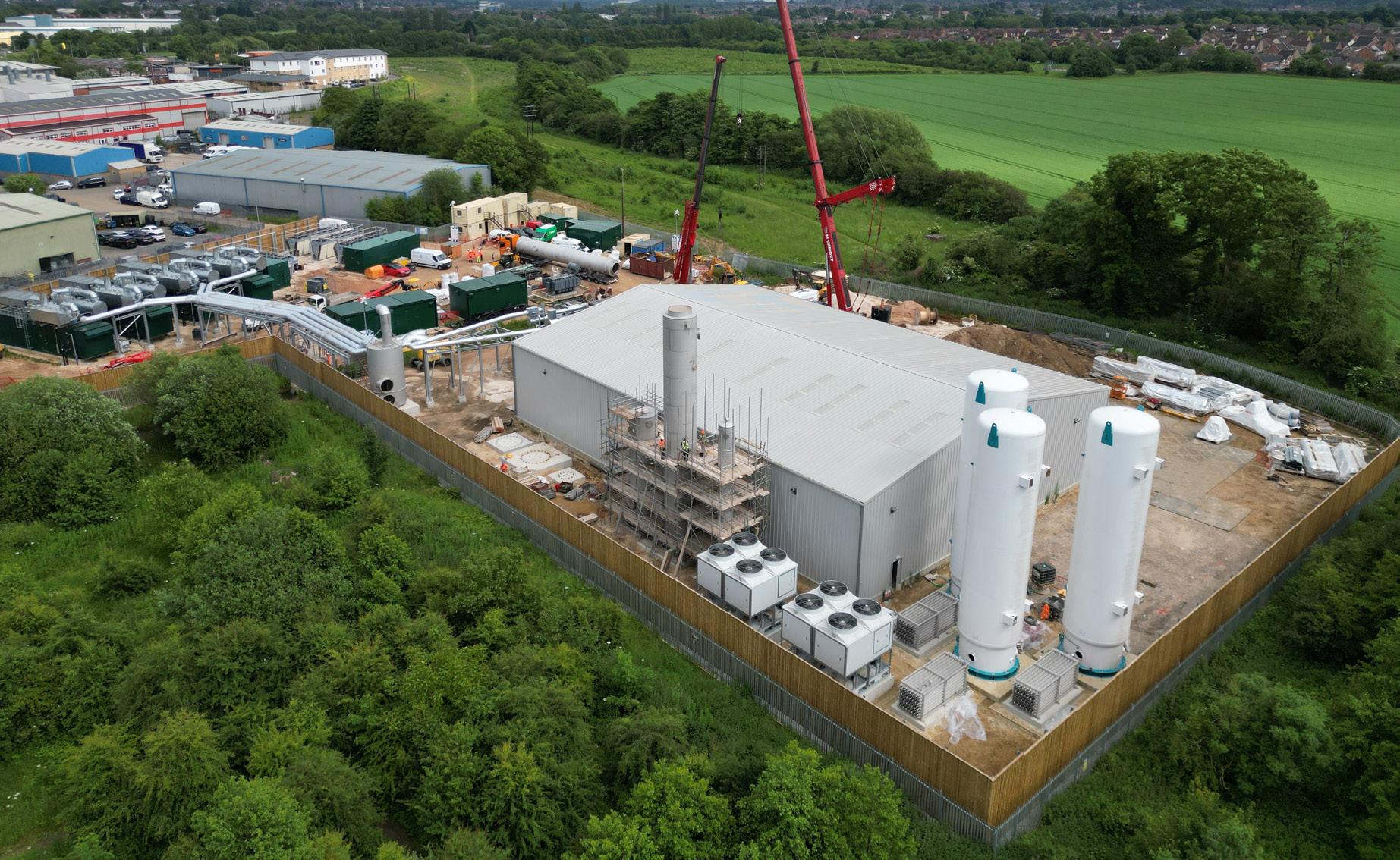
project in Peterlee will cover around four acres in an industrial estate.
“The second project, which we own and control, is going through the pre-financing as we speak. We will be working with a big EPC contractor and we already have the gas supply identified. We are negotiating a 20-year supply agreement for natural gas and we have an offtaker who will send power through the grid or to our private offtakers. We innovate the contracts as well as the technology - this is the first time this has been done,” says Avison.
The site will be home to LMPH’s original FLEXPOWER PLUS® technology which is a method of modularising construction of plants to combine high efficiency power generation alongside carbon capture with the result being a low carbon electricity that can provide baseload power and other useful products. This system, says Avison, allows for a world-class
supply chain at a local level.
“Our FLEXPOWER PLUS® tech is patented and that helps us to work in the way we like – with well-known industry leading companies on a longterm basis. We are not for tendering for every project. We are not talking about 1000MW CCGT, we are talking about 1030MW plants and when we choose our partners, we like to stick with them and build long lasting relationships,” he says.
Longer-term, utilisation of this model will help the company to develop further product lines including the production of e-methanol, widely recognised as the fuel of the future in transportation, and hydrogen which most recognise as the obvious industrial replacement for fossil fuels.
“CO2 is a major part of that from a chemical point of view. We work with technology suppliers that help us produce hydrogen from synthetic gas, and we have signed an MoU with a
big-name brand for CO2, hydrogen and methanol production equipment.”
If the company can demonstrate its capabilities to full effect in County Durham, it will make raising further funding easier. Projects on the ground, showing practical delivery, help financiers to realise the potential returns of investing in projects that are novel. LMPH is busy with a funding campaign in which it states that it will prove its technology as a project developer before becoming an industry-leading technical company.
“That is what our fundraising is based around,” confirms Avison. “We started as an IPP but we are progressing and developing very quickly.”
Ultimately, the offering from LMPH can help to reduce pricing for customers and this is something that will never be ignored.
Continues on page 8
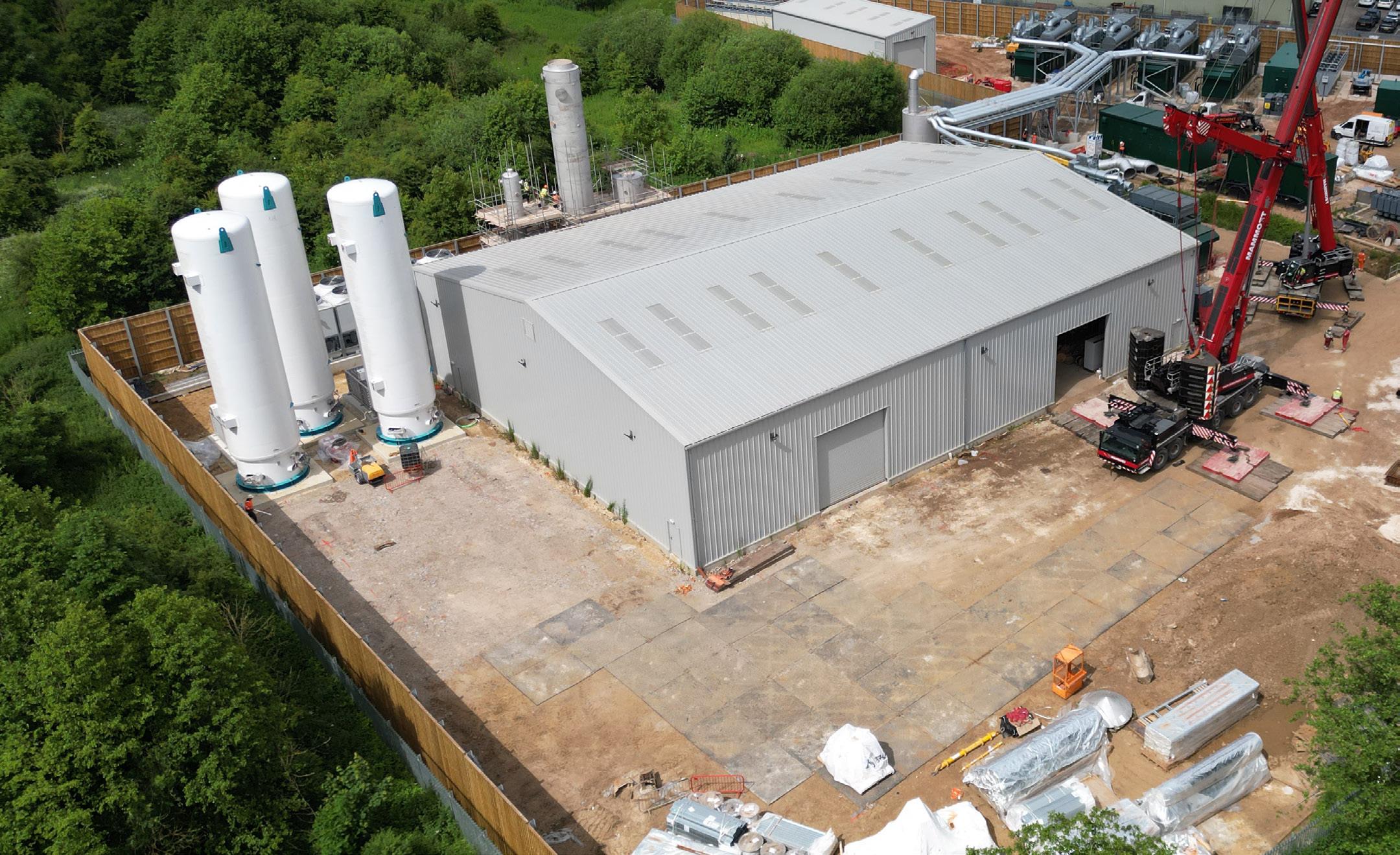
ASCO is proud to be a selected partner of Landmark Power Holdings! Together, we have developed the UK’s first power plant with carbon capture in Rhodesia, Nottinghamshire, contributing to the UK’s net-zero strategy. For decades, our proven carbon capture technology has been helping hard-to-abate industries like power plants, as well as cement, steel and chemical production, to decarbonise their processes.
Capacity range from 500 to 50’000 kg/h (1’100 to 110’000 lb/h)
Captured CO 2 meets ISBT specifications (food and beverage quality)
Low energy usage offering greatly reduced OPEX
Flexibel layout for modular component design possible
Continued from page 6
“We absolutely want to keep it local and work with local communities to stabilise their power pricing,” Avison states.
“It’s all about economics as well as the environmental aspect,” he adds. “The last two years has been a real shock for companies. On our first project, we are buying power in at 33kV and that is costing 35p per kilowatt hour. The wholesale power price is 8p. We have done all the analysis and we know how the price is made up, but some companies are paying a huge amount of money to their supplier. We can literally cut costs in half. When you are looking at spending £5 million per year on electricity, that is quite a significant saving to the bottom line.”
LMPH has been growing quickly since its beginning in 2019. Avison describes
the growth as a “rapid maturation” and says the team has grown to include new disciplines as progress has been made. In the future, low carbon energy systems will be essential in the transition, and the ability to produce by—products including methane, hydrogen, ammonia, carbon dioxide and more will only open up new revenue streams for successful organisations.
In Sweden, LMPH is a shareholder in Nordbex – a distributed carbon negative power generation business, utilising a unique bio energy carbon capture and storage solution Avison says that by using existing ideas in a novel way, the company will produce hydrogen-rich synthetic gas for use in medium-speed engines from biomass gasses before sequestering any carbon emissions in North Sea gas wells. Clearly, the ambition for becoming a technical company is materialising.
“That is moving quickly, we have a lot of traction, and investors are already
coming in,” he says. “We recently tested the engine on the syngas and we managed to achieve what we think is a world record of 45% electrical efficiency using synthetic gas. That project should go live in 2028 but we have a lot of investment going into the development of that. It’s an offshoot of what LMPH is doing but it is part of our technology and we will be applying to make that a patented process technology as well.”
LMPH is also receiving numerous requests from industry for production of synthetic aviation fuel and Avison is again confident that LMPH has the expertise and partnerships to provide it.
“That is where the market is leading us right now, and that is where methanol becomes more important,” he says, highlighting FLEXPOWER PLUS® as an important differentiating factor.
“ASCO does a lot of market research and they see the enquiries roll in about their equipment so that their clients can produce CO2 that can be
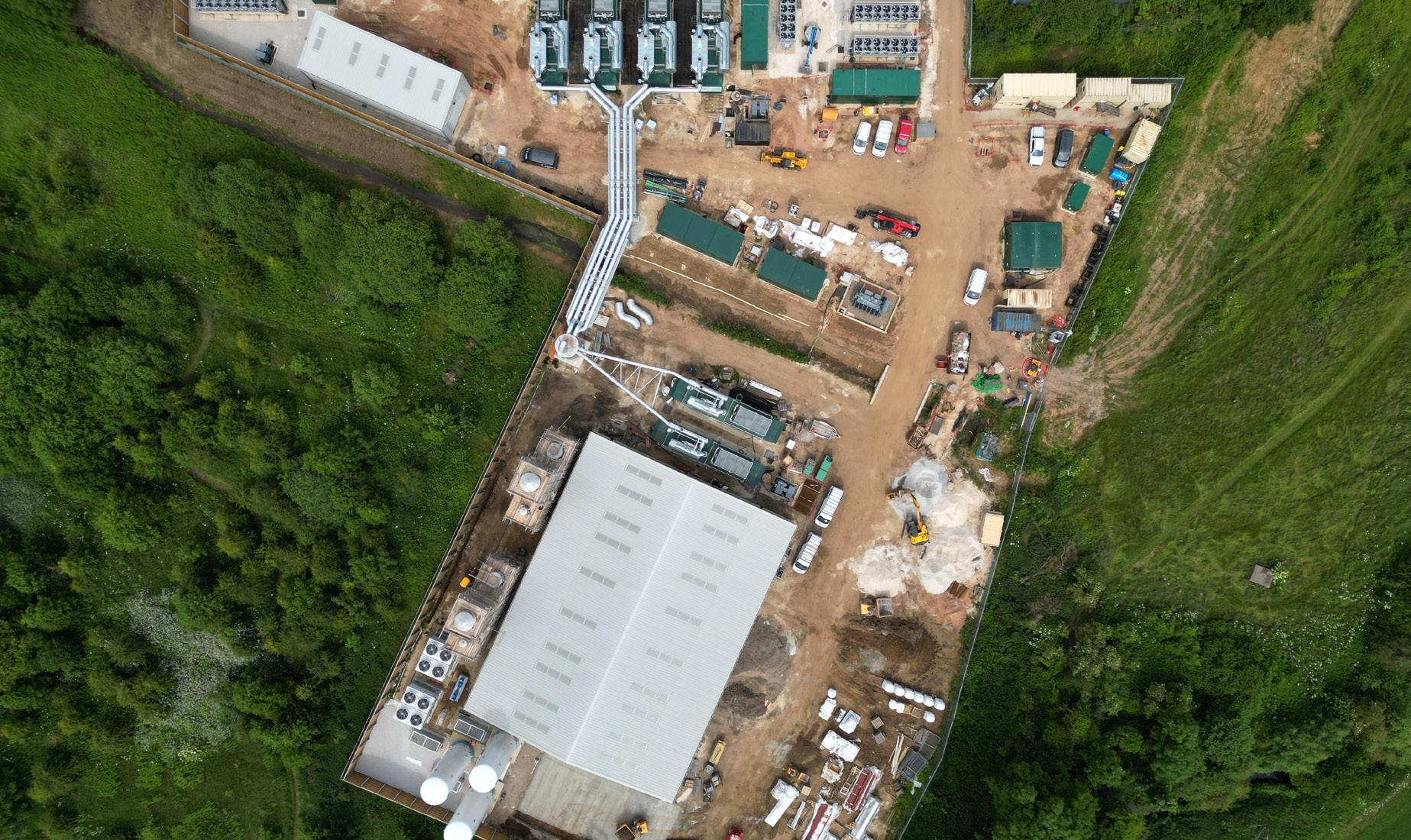


combined with hydrogen. The standard method of producing hydrogen is PEMS or electrolysis. We can do it in a different way but only on a small scale right now. Our method will be 24/7, not reliant on wind blowing, and will be 100% on site, with no need to pressurise or transport [hydrogen].”
// TODAY, WE ARE AN IPP. WE DEVELOP POWER PROJECTS CONNECTED TO THE DISTRIBUTION NETWORK. OUR PREFERENCE IS TO KEEP IT SMALL AND GO LOCAL –THAT IS OUR USP //
While the rest of the carbon capture and storage industry has been slow to move, and many opportunities have passed or been missed, LMPH has been making things happen. This innovative and ambitious company is already an IPP, and has already created infrastructure and ecosystems that can successfully produce power while removing emissions from the process. The speed of implementation from concept to working plant is remarkable, and this is why investors are regularly in touch. Avison says that the speed of progress has been surprising, but he has no intentions of slowing down.
“Starting two years ago, we have achieved our five-year goal of building at least one carbon capture plant. We then said we wanted to produce methanol for the zero-carbon cycle by 2032 but things are moving so fast that
it looks like that will be ready in 2027/28.
“By 2030, we hope to be the technical company that provides solutions, installing on third-party developments. We will operate assets and we will be a partner that can backfit carbon capture tech on existing assets while helping to run those assets.”
Bridging the energy transition with low carbon baseload power using innovative engineering is the task for LMPH and Avison, and so far the company is more than capable of delivering.

